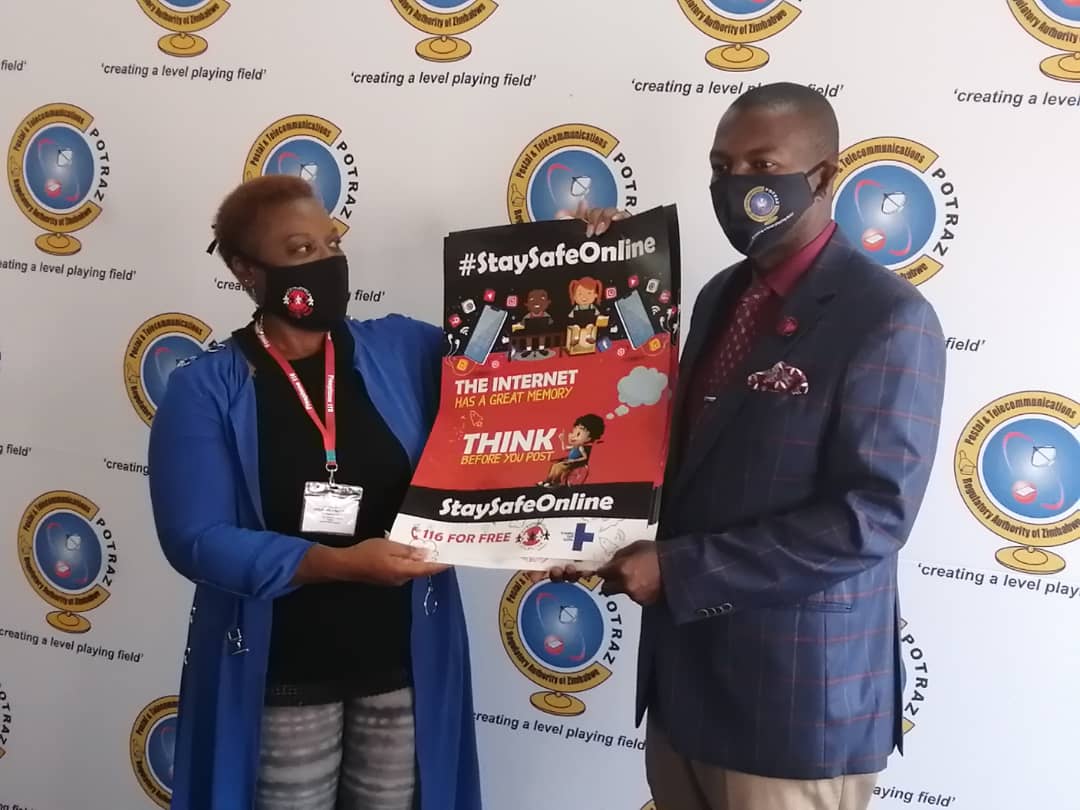The launch of Child Online Protection Guidelines by Childline will go a long way in raising awareness on child online safety.
This was revealed by the Childline Director Ms. Stella Motsi in a speech read on her behalf by Macbeth Makoni, the organisation’s Human Resources and Organisational Development Manager.
“Today brings finality to a process that took close to a year when Childline embarked on a campaign to raise awareness on child online safety after discovering, through the helpline 116, that children and young people were increasingly becoming victims of online violence. The shift of crimes and violence from the physical space to the online space requires a comprehensive and holistic approach and thus the birth of the online safety guidelines,” Ms. Motsi said.
Childline and the Postal and Telecommunication Regulatory Authority (POTRAZ) partnered to develop the online safety guidelines for children and went a step further to develop the Child friendly version of the guidelines.
This culminated in the child-friendly online safety guidelines that carry a range of topics including, cyberbullying, internet addiction, pornography, and online sexual grooming to name a few.
The guidelines have been graphically designed with a child in mind using bright colours and animation. There are knowledge assessment questions through the use of puzzles contained in the book. The guidelines are in three languages, Ndebele, Shona, and English.
She said the guidelines come at an opportune time when exposure to the internet has increased owing to lockdown measures put in place by government to reduce the spread of COVID 19.
“Children’s screen time has more than doubled and predators are lurking behind keyboards. We hope these guidelines will assist in alerting our children, young people, and caregivers of the online dangers and measures that can be taken and how to protect themselves.”
The Childline Directo paid tribute to POTRAZ who made it possible for children to access a free phone, not a toll-free, but free phone 116, which is an emergency number for all children. This has enabled over 2000 children to call childline every day and over 50000 every month. During the lockdown period, the number witnessed an increase in calls by 24% a show of the importance of this number.
“So to POTRAZ, thank you again. As we continue to improve and increase the reporting platforms. We would like to ask for your assistance in the establishment of a free SMS platform to include those with limited access to the calling platform. A free service of this nature would go a long way in ensuring that more children access services timely. We are glad to inform you that we now have a dedicated WhatsApp platform, a chatbot on our website and we shall be happy to announce the SMS platform, with your help.”
POTRAZ Director-General, Dr. Gift. K. Machengete’ s Speech read by George Manyaya, POTRAZ Head of Consumer Affairs and Publicity reiterated the Regulator of the Telecommunications sector’s honour to partner with Childline in efforts to insulate children from the various vulnerabilities they are exposed to online.
He said one third of all Internet users today are children and young people, and UNICEF estimates that 71 per cent of young people are already online. Furthermore, the COVID- 19 has validated the role that ICTs play in the day to day lives and more than ever before, children are using the internet socially and for e-learning services.
He said whilst the Internet has brought about convenience owing to rapid digital transformation, it has also brought about a plethora of challenges.
Children are exposed to various vulnerabilities and there has been an increase in the misuse of technology. Several children are accessing various sites even without their parents’ consent.
“We are providing these gadgets to children but they are accessing sites like tinder, house party, Instagram, Facebook, and TikTok even without their parents/ guardian’s consent.
“Some are exploited by others and become victims leading to cyberbullying, cyberstalking, and Cybergrooming. Most are engaging in pornography and sexting but this has an effect as these pictures and videos are going viral. Some are sending too much information and pictures online for example on TikTok and they are exposing themselves and their families. Furthermore, we have seen a prevalence of obscene photos and videos on social media and this affects careers and the social being of a person.”
Owing to the need to protect children online, The International Telecommunications Union (ITU) in June 2020 revamped its Child Online Protection Guidelines to incorporate and stay abreast of the everchanging ICTs landscape and launched new guidelines which we are in the process of adopting.
Dr. Machengete said there is a need to be cognisant of the fact that technology is disruptive and evolving hence the need to sustain protection mechanisms in line with the International Standards which means the need to continue launching as and when necessary.
The ITU Child Online Protection (COP) guidelines provide a holistic approach to respond to all potential threats and harm children and young people may encounter online.
“It is everyone’s responsibility to protect children from these harms. Close monitoring would minimise issues of abuse, neglect, discrimination and exploitation of children. Key stakeholders for COP include Children and young people, parents, guardians and educators, Government Ministries, Industry and connectivity providers, Research and academia, Non-governmental organizations, Law enforcement, Health and Social services and many others.
“These newly developed COP Guidelines are important for all stakeholders to utilise them for the benefit of our children who are increasingly joining online services. Remember, these children are more vulnerable online since they are young and have little experiences. It is important to appreciate that some children are especially vulnerable, particularly migrant children or children living with a form of disability,” he added.






